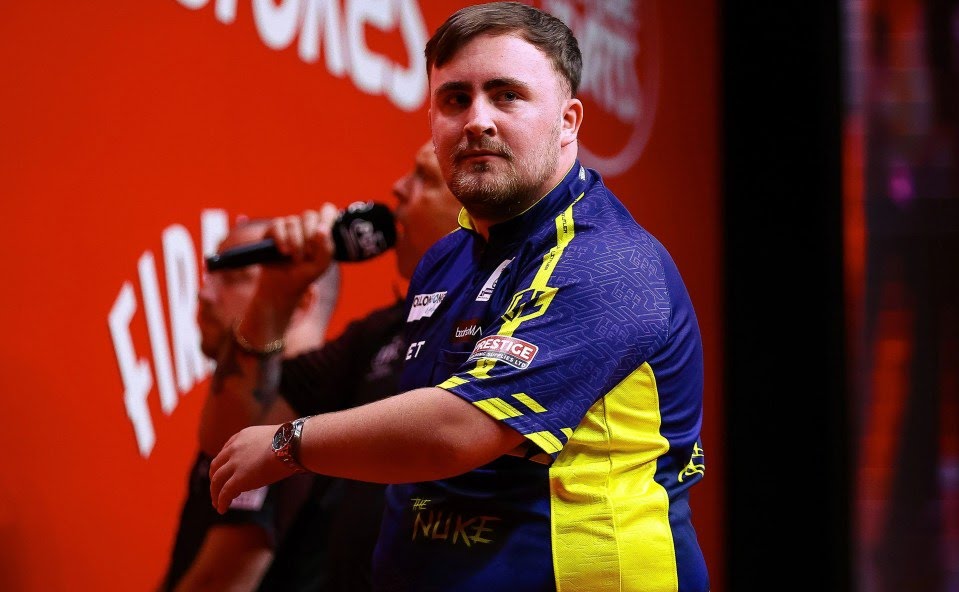
Rising darts prodigy Luke Littler, 17, has captivated the darts world with his impressive skill and rapid ascent to fame. In just a short time, the young champion has not only amassed a following but also significantly boosted his earnings, with his net worth now surpassing £600,000. Littler’s recent decision to move his family from their £180,000 two-bedroom home to a luxurious £6,000-per-month mansion in Warrington’s “Millionaires Row” reflects his newfound success, but this choice has sparked debate and even criticism from within the darts community.
Darts legend Dennis Priestley, a former BDO and PDC world champion, is among those voicing concerns over Littler’s decision to rent rather than buy. Priestley, known for his strong financial prudence and years of experience in the sport, advised Littler against paying a steep monthly rent for a property, arguing that homeownership would be a more practical financial move. In a recent interview with OLBG, Priestley commented, “If he’s only renting, it’s one of the biggest mistakes he’s made and his advisors have made. Why rent when you should be putting your money into bricks and mortar and it being your own house, not paying £6,000 per month to rent a mansion?”
The darts icon also expressed his hope that Littler had sought sound financial guidance, noting that purchasing a property could allow him to establish a stable foundation for his future. Priestley speculated that Littler’s advisors may have encouraged the move for temporary tax benefits but added that he had “never seen the benefits of renting when the money Luke is paying each month could be going to a mortgage.” With his own long-standing career and history of managing the ups and downs of professional darts, Priestley’s words come from a place of experience, and he emphasized, “If he is renting, then it doesn’t make sense to me.”
Priestley’s perspective speaks to a broader conversation around how young athletes and rising stars manage their finances as they step into the spotlight. While fame and wealth can be empowering, they can also present challenges, particularly for teenagers like Littler who are navigating an industry as competitive as professional darts. Priestley’s remarks, though pointed, likely stem from a desire to see Littler succeed not only in darts but in establishing a financially secure future that will sustain him for years to come.
Yet, beyond the financial implications of his choice of residence, Littler’s stardom shows no signs of slowing. His accomplishments in darts have not only brought him financial gains but also propelled him into the celebrity world. Littler is set to make an appearance on ITV’s “Bullseye,” an iconic darts show returning for a Christmas special. This milestone adds to his growing presence in mainstream media and introduces him to an even broader audience. For many fans of the show, Littler’s appearance will be a highlight, bridging a generational gap between seasoned viewers who followed the sport decades ago and younger audiences who are discovering darts anew.
In addition to his “Bullseye” cameo, Littler is reportedly playing a key role in a new Sky series about the world of darts, where he is set to feature prominently in the first two episodes. This series promises to offer fans an intimate look at the lives of players, both on and off the board, and will likely reveal more about Littler’s journey and what it means to become a darts star at such a young age. The series is expected to spotlight the dedication and discipline that goes into being a professional player, as well as the challenges of balancing personal life with public scrutiny—topics that Littler, despite his youth, is already familiar with.
While Priestley’s comments reflect a cautious approach to financial planning, it’s clear that Littler’s career is just beginning, with ample opportunities on the horizon. The endorsement deals, media appearances, and continued competition wins will likely provide Littler with additional financial stability and resources to make long-term investments, whether he opts to purchase property or pursue other avenues.
Littler’s remarkable ascent in darts is also drawing attention for how quickly he’s adjusted to fame. Moving from a modest home to a mansion on “Millionaires Row” symbolizes his meteoric rise in the sport and his status as one of the most promising players in the darts community. This move may be temporary, as Priestley suggested, but it also signals Littler’s arrival on the world stage—a visible transformation that has sparked discussion on how young athletes should navigate newfound wealth.
As Littler’s journey unfolds, fans and professionals alike will be watching closely. His appearances on both ITV and Sky underscore the mainstream appeal of darts and Littler’s role in drawing new audiences to the sport. Meanwhile, as he navigates the pressures of success, Littler will undoubtedly continue to receive both praise and advice from figures like Priestley. In balancing the excitement of fame with the practicalities of financial management, Littler’s story serves as a reminder that success in sports is as much about decisions off the field as it is about skill on it. His choices today, whether in property or career direction, will help shape his legacy in darts for years to come.
Luke littler should be buying a house instead of renting one. Just my thought.